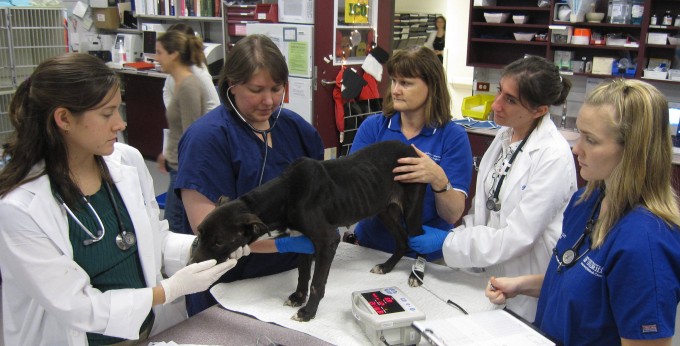What if someone had genuine useful resources that could help those working with animals in the shelter, rescue and veterinary fields cope with emotional numbness, stress, anxiety and burnout? Someone does: The Maddie’s® Shelter Medicine Program at the University of Florida is enrolling students in its online course in “Compassion Fatigue Strategies” with certified compassion fatigue educator Jessica Dolce.
The topic of compassion fatigue has been receiving increasing attention in both the veterinary and sheltering fields since the suicide of Dr. Sophia Yin, a veterinarian who worked with animals with behavior problems and who developed low-stress handling techniques used in many shelters and vet practices. A recent article on the UF shelter medicine website had this to say:
Dr. Yin was a veterinarian and animal behaviorist renowned for developing handling and restraining strategies designed to reduce fear and stress in animals. Her suicide in 2014 haunts many veterinarians, particularly those who work with, and in shelters. In the Online Maddie’s® Shelter Medicine Program, students struggled to make sense of it, and Director of Distance Learning Dr. Terry Spencer realized they were themselves demonstrating signs of compassion fatigue.
“During the course, there are assignments where we talk about controversies in shelter medicine, as well as the difficult decisions and assessments we have to make every day,” she said. “It was clear that many of our enrolled students were struggling with heavy issues in their practice. They have to triage animals, assess their pain, find the resources to help them, or realize they can’t.”
The problem was compounded because many of the veterinarians in the course felt they had little or no influence with management, no way to make things better for the animals, and no control over shelter policies, including those relating to euthanasia.
“We saw that our students and our colleagues were suffering, so we had to do something about it,” Spencer said. “We started including discussion of compassion fatigue, what it is, and what to do about it, in a couple of places in our courses.”
Before her death, Dr. Yin had given them permission to use some of her training materials in the courses. News of her suicide broke in the middle of a behavior course taught by an instructor who knew her. The ensuing grief and shock were a powerful message about the stakes of the problem.
“We realized we didn’t know enough to really help,” Spencer said. “We were bringing students to the brink, getting them to realize they suffered from compassion fatigue, but didn’t have anything to offer them to help.”
She went on the hunt for someone who could help fill this gap for her students. Two former residents in the shelter medicine program had met certified compassion fatigue educator Jessica Dolce at a sheltering conference, and highly recommended her.
“We’re not the only profession that gets compassion fatigue,” Spencer said, “but I’d had no idea there were certified educators in the field. And here was Jessica, who was applying her knowledge specifically to the animal caring professions, and doing it online.”
Dolce is certified in compassion fatigue education by the Green Cross of Traumatology, and received her training through The Figley Institute and Tend Academy. She teaches compassion fatigue classes, both online and around the country, to help people who work with animals be well while they do good work.
For more information on the class, and to enroll, visit “Compassion Fatigue Strategies.”
Also of Interest:

